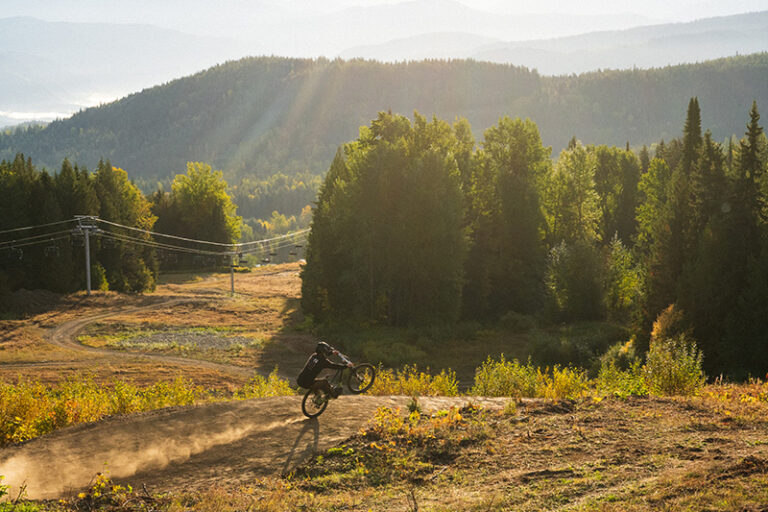According to the National Bike Dealers Association, in 2005, 19.8 million bikes were sold in the U.S. Only about 12% of those bikes were sold from independent locally owned bike shops. The vast majority (over 75%) came from “big box” stores, the same places you buy a waffle iron, hair dye and, in some cases, your weekly groceries. If you are buying a bicycle from a big retailer that doesn’t have an in-store, full bike shop, you’re buying from a big boxer. Traditionally, these big-box bikes are known as “department store” bikes. Don’t buy a department store bike.
Why? Because department-store bikes are made from the cheapest of the cheap materials and components. How cheap? Consider this: the total sales of the department store bikes in 2005 came to about $1 billion. The sales of bikes sold at locally owned bike shops totaled almost $900 million. You do the math: Those department store bikes are cheap.
And you get what you pay for. Very few of the components on a department-store bike are serviceable. That means when something breaks, you can’t fix it. You have to replace it. So practically speaking, most of these department store bikes are disposable, because the cost of replacing many of the parts exceeds the value of the bike very quickly. If you keep an eye out as you ride around town, you’ll see many of these bikes abandoned in alley ways, at the bottom of local ponds, behind dumpsters, and in trash heaps.
If you’re not convinced, buy one for yourself. But please don’t buy a department store bike for your kid. Often these bikes aren’t safe.
On top of the cheap craftsmanship, the folks assembling the bicycles at these big box stores aren’t likely to be trained bike mechanics. Typically, the big box store bikes are often cheap replicas of fully-suspended downhill mountain bikes that have a lot of components to adjust: shocks, gears, brakes, and headsets. Obviously, poorly adjusted brakes are dangerous. But so are loose headsets, which take skill to adjust properly. The same goes for front and rear derailleurs and properly built and tensioned wheels.
When your local bike shop (LBS) receives a bike from the manufacturer, it is mostly assembled. During final assembly at the local shop, the mechanic goes through a list of checks to make sure all components are installed properly and torqued to specification. When you buy a bike from a LBS, you know that a professional mechanic has checked it out and it’s safe for you or your kids to ride. That alone should be the reason to buy from a local shop. In addition, most local shops provide a 30- or 60-day service, where you can bring the bike back in for tuning and adjustment after you’ve broken it in.
I’ve heard some folks say that bike shops are intimidating places, where tough looking, racer-guys size you up when you walk in the door. My answer to that: if that’s the vibe, walk out and find another shop. Spokane has a number of great shops; if you don’t like one, try another. You can find a list of all the local bike shops in Spokane on the Spokane Bicycle Advisory Board website listed below.
And finally, some etiquette. For some reason, some people get into used-car-buying-mode when they buy stuff at a bike shop. I see this a lot when I’m loitering around shops. I don’t understand this; bike shops are retail shops where people are just trying to make a living just like at any other store.
Something to keep in mind is that because of the high cost of labor in the final assembly of the bike, the LBS barely breaks even when they sell you a bike. A 3% margin on a new bike sale is considered good. I can’t believe how many folks I’ve witnessed badgering bike shop employees and owners for some kind of deal or freebee when they purchase a bike. See the side bar for some LBS etiquette tips.
Now that I’ve pledged my allegiance to the LBS, in the future, I hope to write a column suggesting how our local shops may be able to better serve the more utilitarian and urban-minded cyclists in Spokane.
For more information on the environmental and sustainable trade-offs of buying locally versus buying at online bicycle retailers visit Alex Wetmore’s blog at http://blogs.phred.org/shoplocal.
For a listing of local bike shops visit http://www.bikespokane.com/links.html
Local Bike Shop Etiquette
- Don’t go and get advice from the LBS, and then march of to a big box store or go online to some giant distributor and buy the stuff that the LBS told you to buy.
- Don’t ask the LBS to install a component for free just because you bought it from them.
- Don’t expect a discount if the bike shop has to special order something for you and you have to wait for it to arrive.
- Don’t buy some components at an online price-diver or a big box store and then go ask the LBS to install it.
John Speare grew up in Spokane and bikes everywhere.
Don’t miss his blog:
http://cyclingspokane.blogspot.com













